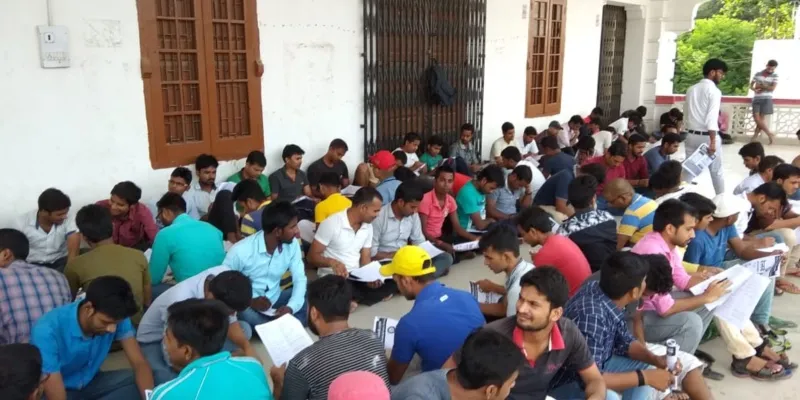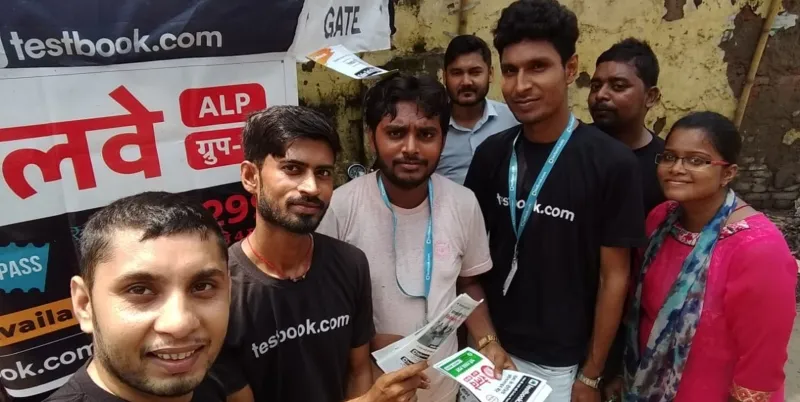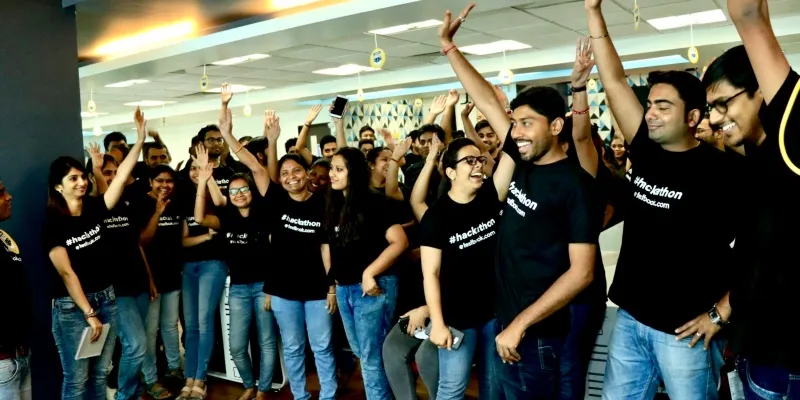Is edtech an online or offline play for India beyond the metros? This Testbook has answers
The Ambassador car with a lal batti and blaring sirens – there is a certain aura that comes with a sarkaari job. In India’s heartland, a government job is much more than just a job, and Testbook is helping aspirants crack the most popular competitive exams in India.
A whopping 70 million young men and women apply for government jobs each year and with the government mandate of online tests, most students are faced with a dilemma – they are not comfortable using computers. Close to 70 percent of government job aspirants come from Tier II, III, and IV cities, and Testbook Founders Ashutosh Kumar and Narendra Agrawal sought to offer a platform that helps students prepare, and then take mock tests for government job entrance exams.
Easier said than done as the founders found out. Testbook was launched in January 2014, but even after two years of starting up, it failed to make a mark.
“It was a big mystery. Despite all major exams moving to a computer-based test, students from Tier II, III, and IV cities still weren’t using Testbook,” Ashutosh says. To understand the gaps, he spent time in Patna and nearby cities to understand the pain points, and then went back to the drawing board.
Today, Testbook claims 1.24 billion questions have been attempted on its website by 5.2 million students who have together attempted 27.5 million tests!
This is how the company turned its fortunes around.

Going the offline way
Ashutosh saw students weren’t comfortable with digital transactions. So, in March 2016, Testbook launched a voucher card called “Testbook Pass”, which allowed students to pay in cash. It worked like a recharge voucher that could be bought for cash and used on the website to give their tests.
Sitting in a Bengaluru restaurant, Ashutosh and Nagendra explain their success has not come easy, and stress the importance of a mix of online and offline play, saying a purely online model would not work in India.
“I spent the initial years of my life at Madhubani in Bihar. It is a different world out there,” Ashutosh says .
The next problem was infrastructure. Close to 80 percent of the students preparing for government exams cannot afford a computer and most go to cyber cafes. “That's when we created Testbook-branded computer labs, and provided a place for students to practise their tests in a real exam environment. We had a 250-student waiting list at our first Patna centre in three months,” Ashutosh says.
A couple of months later, they set up Testbook learning centres in Patna and Bhagalpur – the centres had 30 computers, offered training for mock tests, and had preparation and other study material. There was also an instructor to help students. “Overall, we have 11 such centres spread across Bihar, Uttar Pradesh, Delhi, and Rajasthan,” Ashutosh says.

The team has also partnered with 200 coaching institutes that have computer labs, and integrated Testbook Online Tests with their curriculum. Additionally, Testbook has also partnered with 220 cyber cafes to make its test prep products more accessible.
“In small cities, a brand’s physical presence is critical in building trust. We started with a canopy on the roadside. I still remember, when I was selling the first voucher card, I had to show my IIT alumni card to a student to win her trust,” Ashutosh says.
The founders built a wifi zone, and manually created user accounts for students to help them activate the vouchers.
In April last year, Testbook raised an undisclosed funding led by Matrix Partners. Speaking on why they decided to invest in the edtech startup, Avnish Bajaj, Matrix Partners, India, MD says,
“Ashutosh and Narendra have the right backgrounds and understanding for this market, along with the rigour that goes into training for any competitive exam, as they used to do IIT-JEE coaching and also come from geographies of their target audience. Also, as a market, given the change in test taking mandated to be online by the exam boards, one is asking an audience that has been using an offline model all their life to suddenly take tests online which is a big barrier for them. Testbook and its founders have strongly understood this gap in the market and are bridging it beautifully with an online and offline play."
Standing testimony to Avnish’s statement, Testbook has also partnered with 250 bookstores to provide local access point to students. “We bundled a Testbook Monthly Pass with 25 lakhs books by R S Agrawal (S Chand Publication). This is helping us reach every corner of India,” Ashutosh says.
He adds they have built a very wide funnel of organic traffic through content marketing, a current affairs app, free practise of questions, and even a Youtube Channel. The acquisition cost for each paid user, hence, is only Rs 80.

ExcelMentors to Testbook
Testbook was not always an online-offline play. While at IIT, Ashutosh and Nagendra had started ExcelMentors, a mentorship platform that later pivoted to the online-only version of Testbook.
“In early 2013, while working on ExcelMentors, we realised that the recommendations made by our mentors were not leading to improvement in students’ performances. This was due to lack of accurate data around progress made by students while using our services,” Ashutosh says. They decided to build a one-stop learning platform, Testbook, which was backed by personalised recommendations based on a student’s performance.
The team started extracting data in real time as students attempted tests on the platform; the idea was to replicate one-on-one coaching on a large scale using technology. The platform started with mock tests in five streams for GATE, and soon went on to government exams.
Edtech is a growing market and a report by KPMG and Google says it may touch $1.96 billion by 2021. In addition to a range of smaller startups in the edtech space, there have been some major moves by large players as well. Reliance Industries picked up 72.69 percent stake in edtech AI platform Embibe for $180 million. Online higher-ed platform UpGrad, co-founded by Ronnie Screwvala, has announced partnerships with institutes like IIIT Bangalore and Cambridge Judge Business School, while Byju’s, one of the largest funded edtech startups in India, has an updated app for unique learning journeys, actionable feedback, recommendations, and guided paths.

Also read: Bharat ek khoj: The hunt for the next 500 million digital content consumers
Building the offline play and its challenges
Rajat Agarwal, Vice President, Matrix Partners India, says,
"The market that Testbook is targeting is different. The target audience is mostly offline, the tricky part is to get this audience online. Ashutosh is from Bihar, he understands the market and the audience. Tier II and III India needs hard on-ground execution. And the team at Testbook is doing that."
For an offline channel, customer acquisition cost is around Rs 90, while the operational cost of running a test centre is Rs 40,000 to Rs 50,000 per month, depending on the location. While the Testbook team refused to share costs, Ashutosh says the company has seen huge growth and is clocking revenue growth of 300 percent year-on-year.
“We have just crossed 5 million registered users with over 10 million installs on our Android app. We have over 10 million students visiting our website and apps on a monthly basis. More than 1 lakh tests are being solved on our platform on daily basis. Apart from this, thousands of users are watching our video lectures for concept-building,” Ashutosh says.
He adds that there is a huge trust factor associated with the brand and as many officers get to their sarkaari offices, each one is a victory for Testbook.







